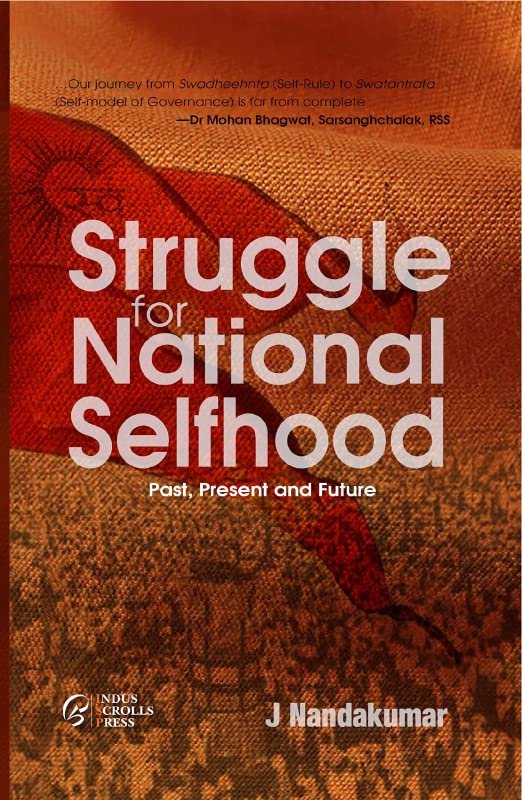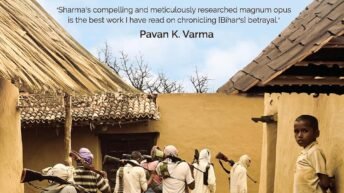|
Listen to article
Getting your Trinity Audio player ready...
|

The state, the government, political parties and social organizations play a critical role in shaping national vision. It is both important and imperative that they articulate their vision for the nation clearly, set transparent agendas for the future, and engage in a dialogue about the nation’s future with its people. The Rashtriya Swayamsevak Sangh (RSS) understands this need for such articulation and dialogue well, and has been constantly making efforts to put forth its vision for India that is Bharat. As India enters the Amrit Kaal, it pays homage to all the freedom fighters who sacrificed their lives for its independence. The central government is at the forefront of this initiative to bring into the limelight the contribution of lesser-known freedom fighters and give them their due as well. This initiative of the government has triggered a larger debate about the Indian citizenry’s perception of the freedom struggle and the intricacies of the popular narrative about the Indian struggle for independence. There is an emerging consensus among substantial sections of society and the government that there is a need to revisit our perception of our freedom movement by adopting a different approach to history writing. The art of history writing is now expanding beyond the confines of scripting singular grand narratives, and is moving towards celebrating clusters of alternative localized histories.
RSS, being the largest social organization of India, has taken up the mantle of getting the masses acquainted with the lesser-known figures and stories of our struggle against European colonial rule. It has also been encouraging historiography on these lines. There is a shifting focus on the role of revolutionaries and localized upheavals in the uprooting of colonial rule. This exercise surely leads to the questioning of some of the arguments of mainstream historiography on the freedom movement such as the presentation of the freedom struggle as an overarching, one-party movement. In this backdrop, a book authored by Shri J. Nandakumar (National Convener, Prajna Pravah, RSS) and titled ‘Swa: Struggle for National Selfhood – Past, Present and Future’, lays out the vision of the RSS with regard to the recording of Indian freedom struggle. This book carries immense significance due to a couple of reasons; first, that Prajna Pravah is the intellectual wing of RSS and plays an instrumental role in the ideation of its agendas, and second, that this book in particular is an articulation of the organization’s framework for constructing an alternative perceptual paradigm of the Indian freedom struggle.
It is important to note that the introduction/foreword of the book is actually a translation of the speech delivered by RSS Sarsanghchalak Dr. (Shri) Mohan Bhagwat on the occasion of Shri Vijayadashmi Utsav 2021 on 15th October 2021. As noted at the launch of this book, Dr. Mohan Bhagwat made a significant statement during his speech, wherein he said that the 15th August 1947 marked India’s ongoing journey from Swadheenata to Swatantrata. The statement acted as a driving force for completing this journey, and this book is an attempt to craft an intellectual framework for attaining Swatantrata, which can be achieved only through the reclamation of ‘Swa’. The book is a first step towards the restoration of ‘Swa’ through the reclamation of the discourse of the Indian freedom movement. It provides an intellectual framework to study and narrate the movement from an authentic Indian perspective, which may well serve as a common Indian’s view on how one’s ancestors achieved their independence. As noted by Shri Arun Kumar, Sah-Sarkaryavah of the RSS, at the launch, the book has been structured so as to highlight the resistance offered by Indians in every field of life against European colonisation, and this structure shall be used and presented to the masses on a bigger canvas.
In the words of the author, “The purpose of this book is to present the Freedom Struggle from the perspective of Swa and rectify our identity as a Rashtra, which was distorted and twisted by Islamic-Leftist historians in the second half of the twentieth century.” The book is thus a narrative building exercise and has been conceived as a point of inception for new historiography which approaches the European colonial period in the awareness that “our national leaders realised that all facets of Bharatiya culture, including its rituals, ceremonies, music, literature, theatre, industry, and religion, contained the principles of Sanatan Dharma, and resurrecting them was the only way to bring the nation together and restore it to its past splendor.”
Swadheenata, Swadharma and Swaraj were the foundational pillars of the independence movement, and remain equally essential to the rise of a decolonised Bharat but their true meaning can’t be grasped without the decolonisation of our historiography, which will require rewriting it from the perspective of the freedom fighters.
As put by Shri Arun Kumar, the book seeks to address four key themes while chalking out the history of India’s freedom struggle: first, the need for a thorough knowledge of the indigenous communities, their culture, traditions and practices before the advent of the European colonial invasion; second, achieving a clear understanding of the viciousness of colonial rule and its domination over the physical and mental spaces of indigenous people; third, providing a broad appreciation of the overall pushback offered by the native people of Bharat against colonialism; fourth, carrying out a deconstruction and nuanced consideration of the British project of “de-nationalization, de-Hinduization and de-socialization” of Bharat.
The author has retraced the entire European colonial period, from its origins to the eventual demise of political colonialism. In the book, a serious effort has been made to portray the armed resistance offered by the indigenous communities and their leaders, without being defensive about it. The multiple instances of armed resistance across the period have been showcased not as mere sporadic events, but as manifestations of a continuous physical and psychological war against the colonisers. They show that this continuous series of incidents continuously helped weaken and eventually wipe out the British colonial state. While providing this perspective of the freedom struggle, the author makes sure to also address the lacunae and distortions in the mainstream account of Indian independence created by a small coterie of western-trained historians in the post-colonial period. The book persuasively challenges the portrayal of the freedom struggle as a largely non-violent movement, and questions the sketching of colonised Indians as submissive, meek individuals who avoided opting for armed resistance. The author has tried to encapsulate, as far as possible, all the dimensions of resistance practiced by Indians in diverse fields. including the natural sciences, social sciences, literature, art and cinema.
Shri Nandakumar’s book also carries valuable lessons for the present and the future, specifically in order to expose Nehruvian secularism, ensure national integration, prevent the dismantling and fragmentation of the cultural-cum-national identity, and establish a confident Indic civilization and state. With regard to the realisation of ‘Swatva’ and national integration, he states: “We must bear in mind that integration cannot happen on the basis of false premises and narratives. Honesty should be the buzzword. The Western ideas of secularism and multiculturalism have been thrusted upon us to counter the imagined threat of majoritarianism… One of the major challenges before our nation is achieving national integration. For this, we have to look at our own civilisation for solutions. Grafting foreign ideas on our consciousness will have an adverse impact on the polity and psyche of the nation… The best way to deal with it is the Hindutva way: It seeks to emphasize on the commonalities that exist among Indian people belonging to different faiths rather than hyping or harping on the differences. Uniformity is not what we aim at, but assimilation: That is consistent with the abiding spirit of India.” This book is a must-read for all the stakeholders of Bharat 2047 involved in weaving a coherent vision for our shared future.






Add comment